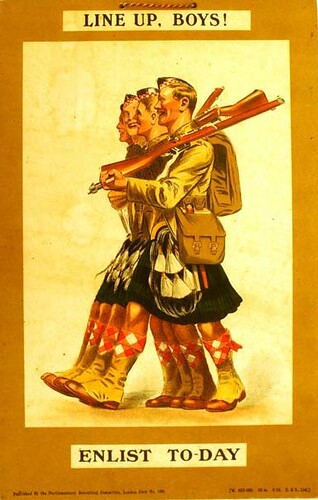http://www.flickr.com/photos/mfspeccoll/4900307706/in/set-72157624742434942
 In this English poster, boys are encouraged to enlist for the war effort. The four boys depicted in the poster are all smiling, walking in perfect formation, and look like a big, 8-legged monster. Their bodies seem to blend together into a single conglomeration of uniforms. In contrast to certain posters, like those of Lord Kitchener, which point directly at the viewer, singling him out, this poster makes the viewer imagine himself as part of a unit of other boys just like himself. This takes away from the apprehension he might feel at enlisting by himself, because he will become part of a unit just as soon as he enlists. James writes that "Posters 'should be single, clear, specific' and 'must appeal to the emotions rather than to the intellect' (20). The image of all the enlisted boys walking happily side by side appeals directly to the 'emotions' of the viewer, turning the act of enlistment from a dreaded duty into a fun adventure.
In this English poster, boys are encouraged to enlist for the war effort. The four boys depicted in the poster are all smiling, walking in perfect formation, and look like a big, 8-legged monster. Their bodies seem to blend together into a single conglomeration of uniforms. In contrast to certain posters, like those of Lord Kitchener, which point directly at the viewer, singling him out, this poster makes the viewer imagine himself as part of a unit of other boys just like himself. This takes away from the apprehension he might feel at enlisting by himself, because he will become part of a unit just as soon as he enlists. James writes that "Posters 'should be single, clear, specific' and 'must appeal to the emotions rather than to the intellect' (20). The image of all the enlisted boys walking happily side by side appeals directly to the 'emotions' of the viewer, turning the act of enlistment from a dreaded duty into a fun adventure.
This poster would easily appeal to the spirit of someone like Roland, who was determined to earn medals for his valor. It is easy to see how some young men and boys may have gone to the front expecting the army to be not much more than playing a pretend-war with the other boys in the neighborhood. The most insidious part of the poster is how it directly addresses the fact that boys (not mature men) are being enlisted into the army; it does it so directly, and presents such a positive image to be associated with it, that the viewer may believe that the deployment of boys may not only not be a bad thing, but that it may be a beneficial experience that appeals to a young boy's sense of adventure (as well as his naivete).

Comments
Jeff Drouin
Sun, 02/03/2013 - 06:34
Permalink
A strong reading of the
A strong reading of the poster, Will. I like the way you compare it with other posters that call out individuals. I would only add, though, that it seems to use the term "Boys" as a term of cameraderie, not for identifying children. The males in the picture look like grown Scotsmen to me.
Do you think Roland's staunch individualism might have resisted this poster?
Also, thanks for tagging your post. In the future, though, please begin each term with a capital letter (i.e. Britain, not britain). Also, since I brought up that exampe, let's use proper names for nations, (i.e. Great Britain).
Will Boogert
Sun, 02/03/2013 - 14:30
Permalink
I just went back and tried to
I just went back and tried to capitalize all the tag words, but only Great Britain and Vera Brittain stayed capitalized in the list when I reposted the article. The others reverted to being uncapitalized.
I agree that the poster doesn't necessarily refer to just young boys. In that case, my point about concealing the questionable practice of recruiting boys can be ignored, but my point about joining a "unit" still stands.
It's probably true that Roland wouldn't have been swayed by a poster like this. I imagine he joined the army in spite of the thought that he would look like one of the happy Scotsmen in the posters. His individualism motivated him to seek glory for his own reasons, which had nothing to do with the political reasons behind the War.
Olivia Wood
Sun, 02/03/2013 - 14:33
Permalink
I like your comparison to the
I like your comparison to the boys being like an 8-legged monster. However, I am not sure how much this particular poster would have appealed to Roland, since it seems to maintain the idea of losing one's identity in the mass of other soldiers. I think Roland might have reacted more to the other type of poster you mention, where the viewer is singled out and called upon to join the war effort.
Logan Eddy
Mon, 02/04/2013 - 16:54
Permalink
I do have to agree with your
I do have to agree with your post especially when you say the men are all marching as one entity. I do agree that this mentality, more than likely, did help persuade those who were apprehensive about joining on the grounds that they would be part of a group going on a great adventure in duty of their country.